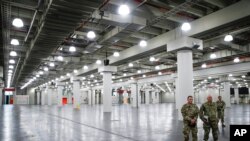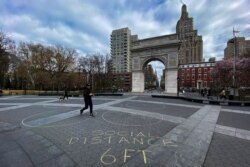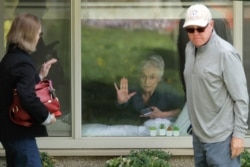The growing coronavirus pandemic has forced millions of Americans to make a once-in-a-lifetime tradeoff: temporarily relinquishing numerous individual rights to protect public health.
Consider what has happened in just the last two weeks.
Churches, synagogues, and mosques have closed their doors to congregants while thousands of small businesses in parts of the country have been forced to shut down.
Courts have delayed trials despite the American constitution's guarantee of a speedy trial while families and lawyers are barred from visiting inmates at state and federal jails and prisons.
Across the country, residents have been ordered to avoid large public gatherings. In California, New York and other hard-hit states, more than 80 million people have been ordered to “shelter in place” to avoid contracting or spreading the virus. All of which has raised questions about freedom of movement and the right to travel.
It's not just the freedom to assemble or operate a business that many Americans have been forced to give up. Democratic norms such as government transparency have been affected as well. States and municipalities have suspended so-called open meeting laws that ensure citizens access to the inner workings of government.
Experts say these civil liberties strictures are unprecedented. Never before have the federal government and all 50 states declared states of emergency in response to a public health disaster, according to James Hodge, director of the center for public health law and policy at Arizona State University.
"As a nation, we've thrown at COVID-19 every foreseeable type of emergency declaration that we can issue," Hodge said. "We're doing it in a way that is trying to calibrate and balance civil liberties and consistent with the threats and risks that we face."
The declarations have in turn enabled officials to take sweeping measures, from relaxing regulatory standards for vaccines and treatments to restricting people's movement and ability to assemble.
The measures are based on a long-recognized legal principle: extraordinary circumstances can justify extraordinarily action.
“Pandemics can justify restrictions that burden civil liberties much more than we’d normally tolerate – but perhaps they can’t justify restrictions that completely deny some right," said Eugene Volokh, a law professor at the University of California at Los Angeles.
The crisis in the U.S. has rapidly grown in the past week or two, with reports of more than 46,000 coronavirus cases of more than than 580 deaths as of early Tuesday.
Protecting public health while protecting constitutional rights is a balancing act -- and a recurring theme in American history. Ben Franklin, one of America's most beloved founding fathers, once said, "Those who would give up essential Liberty, to purchase a little temporary Safety, deserve neither Liberty nor Safety."
For Volokh, a libertarian constitutional scholar no less, Franklin's famous line cries out for an update amidst the country's worst public health disaster in more than a century.
"Those who would give up essential Safety, to purchase a little temporary Liberty, deserve neither Liberty nor Safety," Volokh wrote in a recent blog post.
It is a message that Americans are increasingly embracing despite pushback by some individuals. Rabbi Jack Moline, president of the Interfaith Alliance in Washington, said American churches, synagogues and mosques have heeded calls to limit – and in some cases eliminate -- public worship.
“What we’re balancing here is the safety of the general population and the sacredness of individual rights," Moline said. "As long as everyone is being treated equally in the public interest, I think Americans will absorb the temporary limits on some of their freedom of expression.
“While authoritarian countries such as China have a freer hand in taking hardline steps, U.S. laws governing emergency declarations such as the National Emergencies Act come with constitutional protections that can't be put aside, said Latisha Nixon-Jones, an expert on disaster laws at the University of Oregon.
"All of these things (National Emergencies Act, the Stafford Act), when crafted by our own legislature have taken into consideration our own constitutional rights," Nixon-Jones said.
But just how far the government can go before it bumps into violating rights is a question many scholars are asking. Volokh said he worries that officials might use the current crisis as a convenient excuse to impose unrelated restrictions.
In California, the mayor of San Jose, the state’s third-largest city, last week declared that “gun stores are non-essential.” In Ohio, the state attorney general ordered several health clinics to stop non-essential abortions.
Volokh said it “might not be OK to completely close abortion clinics or gun stores [even alongside all other businesses] if the result is that people just can’t get abortions or guns at all."
On the other hand, banning political rallies might be acceptable because “people can still speak and organize political action online,” Volokh said.
Hodge said restrictions such as suspending certain patients' privacy rights and barring visitors to prisons are justified during the pandemic.
"Can we do that without violating constitutional rights? Yeah, absolutely," Hodge said.
What is unlikely to pass constitutional muster is what China did to fight the virus, ranging from complete lockdowns of entire cities enforced by guards to digital surveillance of at-risk residents to mass testing.
While successful in China and elsewhere, such methods are too draconian and unlikely to be tried in the United States, Hodge said. While authorities have the power to quarantine large groups of infected individuals, large-scale domestic travel bans and cordon Sanitaire are constitutionally problematic.
“We’re not an authoritarian nation,” U.S. Surgeon-General Jerome Adams said during a recent "Fox & Friends" interview. “So we have to be careful when we say, ‘Let’s do what China did, let’s do what South Korea did.”
Rabbi Moline warned that Americans' tolerance for the civil liberties restrictions will run out once the crisis is over.
"The time I’d begin to worry is if the emergency is lifted and there were some continuation of the restrictions on our civil rights that are necessary in crisis but unnecessary when there is no crisis," he said.







